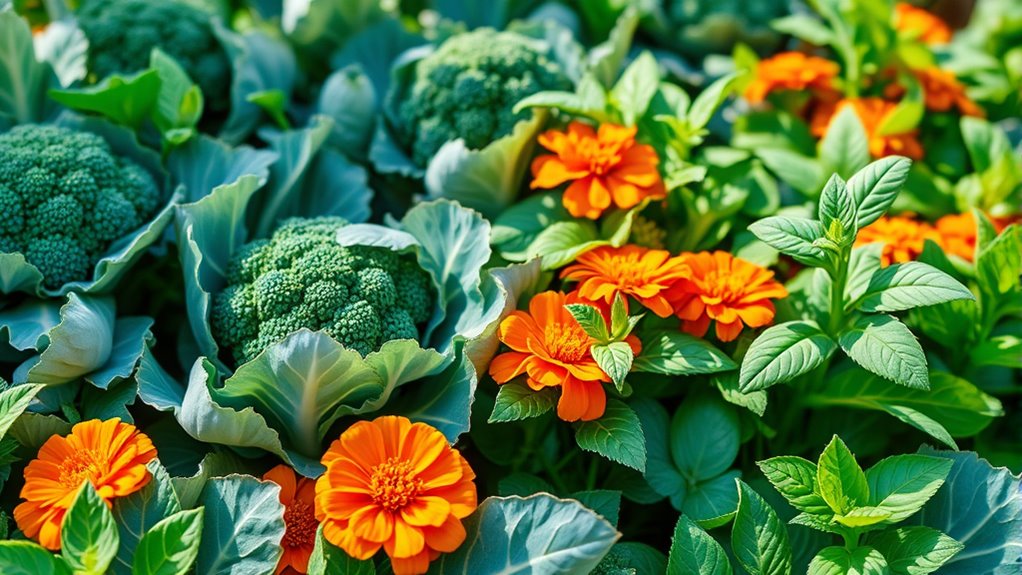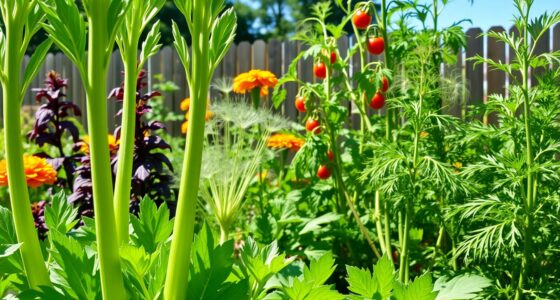For the best companion plants for broccoli, plant garlic, onions, and aromatic herbs like basil, dill, and cilantro to naturally repel pests. Grow legumes such as peas or beans to fix nitrogen and improve soil health. Add ground covers like celery and spinach to suppress weeds and retain moisture. Bright flowers like marigolds and nasturtiums attract beneficial insects and act as pest traps. Keep exploring to discover more tips for a thriving, pest-resistant broccoli garden.
Key Takeaways
- Plant garlic, onions, and marigolds to repel pests like aphids and nematodes naturally.
- Grow herbs such as basil, dill, and cilantro to attract beneficial insects and enhance pest control.
- Include legumes like peas and beans to fix nitrogen, improve soil health, and support healthy broccoli growth.
- Use ground cover plants like celery and spinach to suppress weeds and conserve soil moisture.
- Incorporate pest-trapping flowers like nasturtiums to attract pests away from broccoli and promote biodiversity.
Kale and Other Leafy Greens
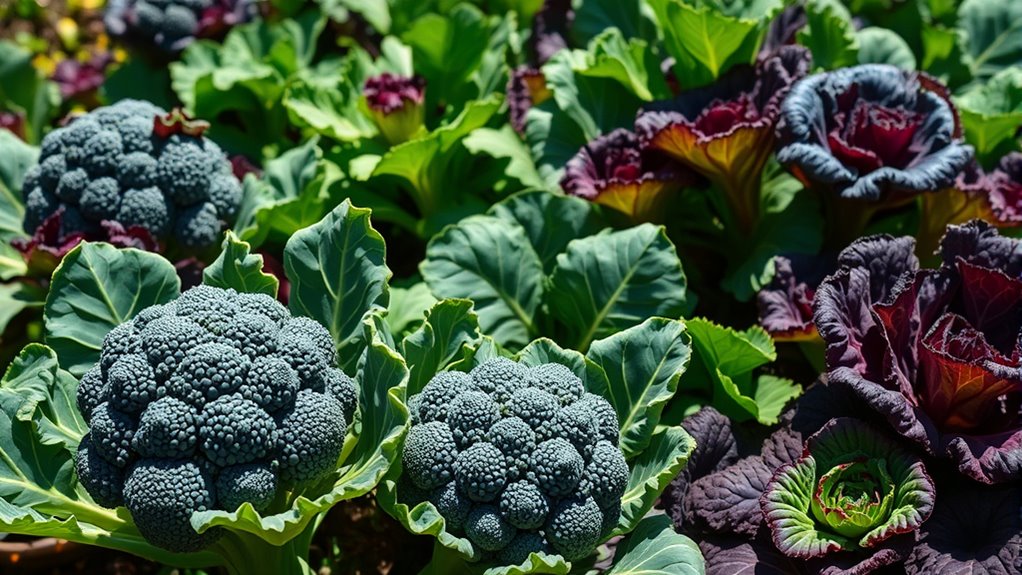
Planting kale and other leafy greens alongside broccoli can boost your garden’s health and yield. These greens help shade the soil, reducing weed growth and retaining moisture, which benefits broccoli roots. Kale, spinach, and Swiss chard grow quickly, providing ground cover that discourages pests and protects the soil. They also add nutrients to the soil through their deep roots, which can improve soil fertility for broccoli. Plus, leafy greens attract beneficial insects like pollinators and predatory bugs that help control pests naturally. When you plant these greens together, you create a diverse ecosystem that promotes plant health and productivity. Incorporating mindfulness techniques into your gardening routine can enhance your connection to the natural environment and improve your overall gardening experience. Just make certain you space them properly to avoid overcrowding, allowing each plant to thrive and maximize your garden’s overall potential. Additionally, practicing sustainable gardening practices can lead to healthier soil and a more resilient garden ecosystem over time. Engaging with companion planting can also help you understand how different plants support each other, leading to more effective garden management. Incorporating these companion plants also encourages curiosity-driven learning about sustainable gardening practices, enhancing your knowledge and skills over time.
Aromatic Herbs to Deter Pests
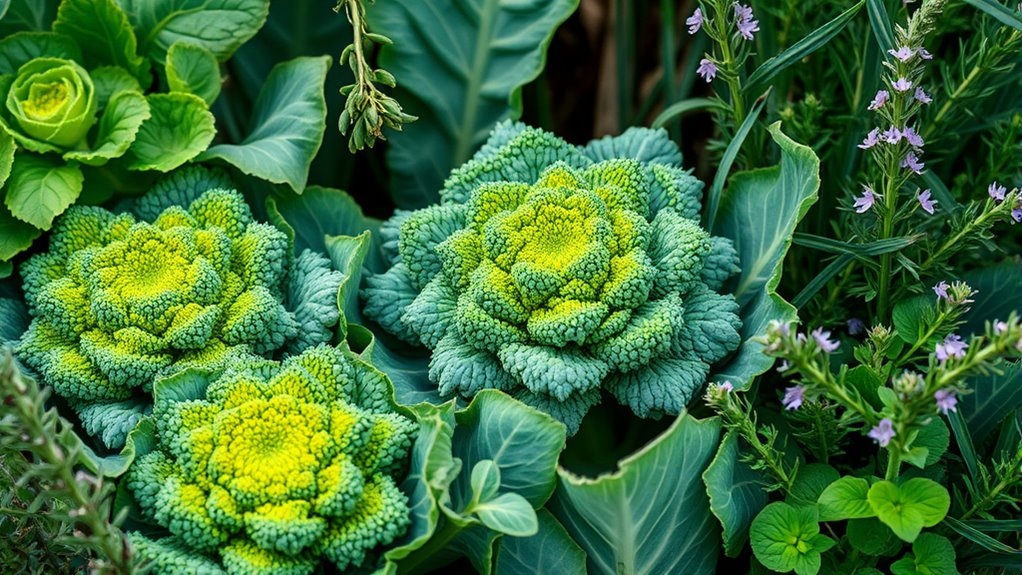
Aromatic herbs are a natural and effective way to keep pests away from your broccoli. They emit strong scents that confuse or repel insects, reducing the need for chemical sprays. Planting herbs like basil, dill, and cilantro nearby creates a protective barrier, deterring common pests such as aphids, cabbage worms, and flea beetles. These herbs also attract beneficial insects that prey on pests, enhancing your garden’s natural defenses. Incorporating pest deterrent plants into your garden layout can further improve pest control. Additionally, understanding integrated pest management practices can help you develop a comprehensive approach to pest control, minimizing chemical use. Cookies and other tracking technologies can provide insights into how your garden is performing and help optimize pest management strategies. Plus, they add fresh flavors to your meals and improve overall garden health. Incorporate these herbs into your planting strategy for a pest-resistant broccoli crop and a more vibrant, thriving garden.
Legumes for Nitrogen Fixation
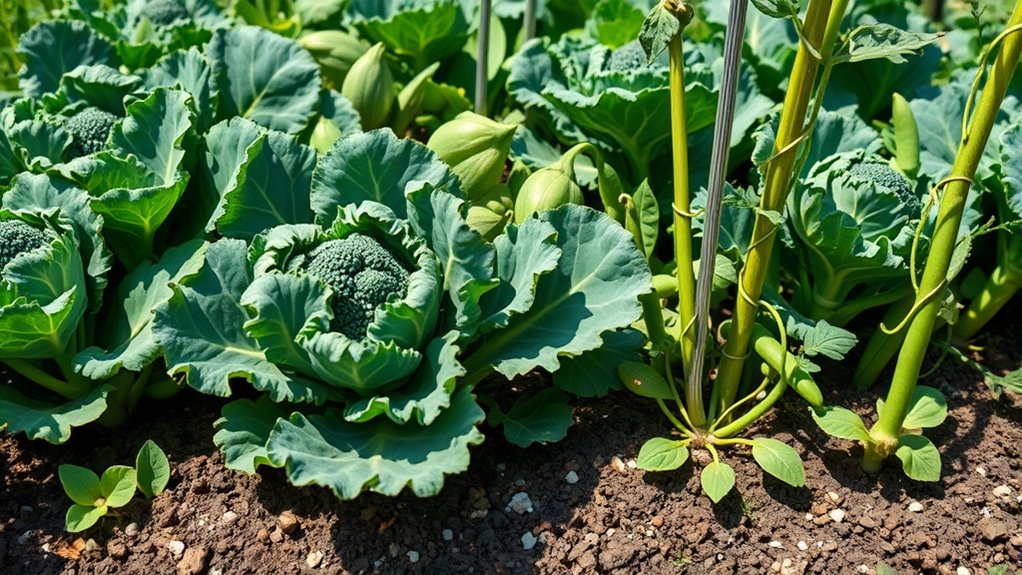
Planting legumes next to your broccoli boosts soil fertility naturally. They fix nitrogen from the air, reducing your need for chemical fertilizers. This support helps your broccoli grow stronger and healthier throughout the season.
Enhances Soil Fertility
Legumes are excellent companions for broccoli because they enhance soil fertility through nitrogen fixation. This process naturally adds nitrogen to the soil, which is essential for broccoli’s healthy growth. When you plant legumes like peas or beans nearby, they establish a symbiotic relationship with soil bacteria, converting atmospheric nitrogen into a form plants can absorb. This reduces your need for synthetic fertilizers and promotes sustainable gardening. By improving soil health, legumes create a richer environment for broccoli and other crops. Plus, their roots help aerate the soil, preventing compaction. Incorporating legumes into your broccoli bed can lead to more vigorous plants and higher yields. Additionally, integrating unique planter designs can facilitate better root development and soil management. Using companion planting techniques can further optimize your garden’s productivity and pest control. Overall, planting legumes offers a smart, eco-friendly way to boost your garden’s productivity naturally. Implementing sustainable practices supports long-term soil fertility and environmental health.
Reduces Need for Fertilizer
Because legumes have the unique ability to fix atmospheric nitrogen through their roots, they considerably reduce the need for synthetic fertilizers when grown alongside broccoli. As legumes form symbiotic relationships with nitrogen-fixing bacteria, they convert atmospheric nitrogen into a form plants can absorb. This process enriches the soil naturally, providing essential nutrients to nearby crops like broccoli. By planting legumes such as peas, beans, or lentils near your broccoli, you can cut back on fertilizer use, saving money and reducing environmental impact. This natural nitrogen boost supports healthy broccoli growth without relying heavily on chemical inputs. Incorporating legumes into your garden not only benefits your broccoli but also promotes a more sustainable and eco-friendly gardening practice. Understanding plant symbiosis can help you create engaging audio environments that complement your gardening themes or educational content.
Supports Broccoli Growth
When grown alongside broccoli, legumes actively support its growth by fixing atmospheric nitrogen into the soil. This natural process enriches soil fertility, providing essential nutrients that help broccoli develop strong, healthy heads. By partnering with legumes like peas or beans, you can reduce your reliance on synthetic fertilizers and boost overall crop vitality. Legumes improve soil structure, increase microbial activity, and promote better root development for your broccoli plants. Their presence fosters a balanced ecosystem in your garden.
- Enhance soil nitrogen levels naturally
- Reduce need for chemical fertilizers
- Promote healthier, larger broccoli heads
- Support sustainable gardening practices
Nasturtiums: The Pest Repellent
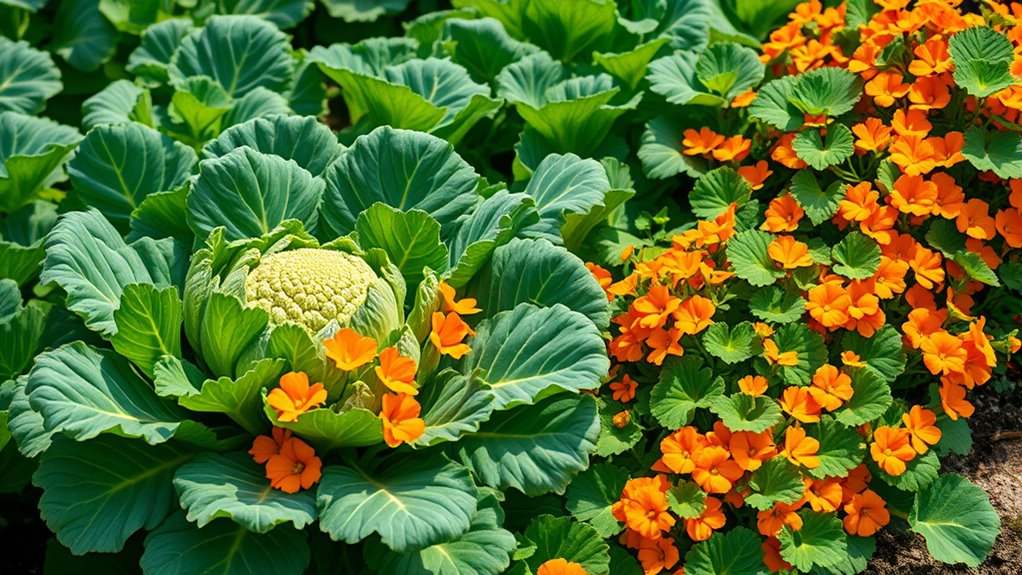
Nasturtiums are a popular companion plant for broccoli because they act as natural pest repellents. They draw pests like aphids, whiteflies, and squash bugs away from your broccoli, protecting your crop without chemicals. The bright, colorful flowers attract these pests, keeping them occupied and away from your main plants. Nasturtiums also produce a strong aroma that deters more stubborn pests, reducing the need for intervention. Plus, they’re easy to grow and add visual appeal to your garden. By planting nasturtiums nearby, you create a natural barrier that helps keep pests at bay, promoting healthier broccoli plants. Incorporating nasturtiums into your garden not only enhances pest control but also adds a splash of color and biodiversity to your growing space. Using companion planting strategies like this can improve your garden’s overall health and productivity.
Onions and Garlic for Pest Control
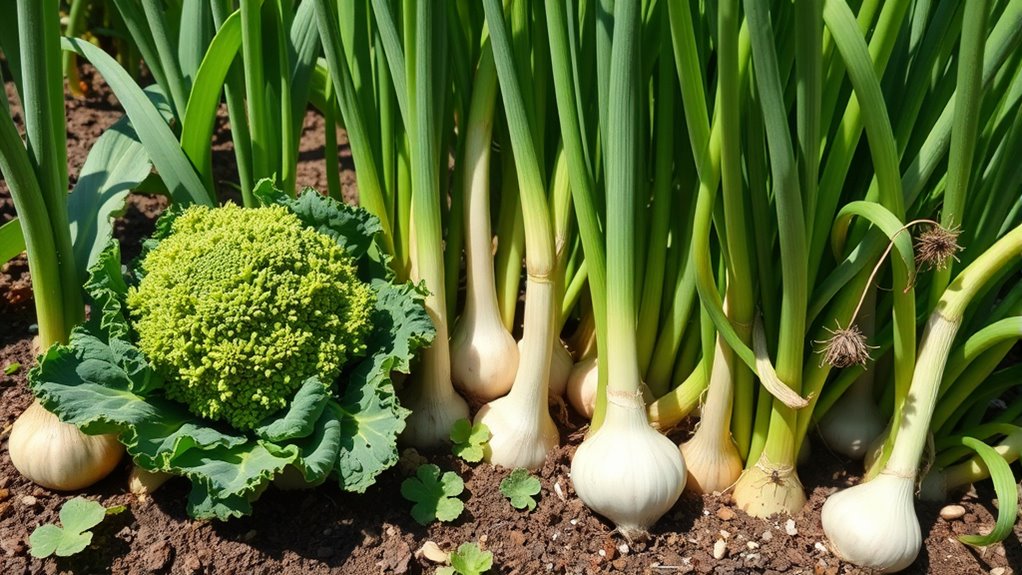
Onions and garlic act as natural pest deterrents that can keep unwanted insects away from your broccoli. They’re especially effective at repelling aphids, which often threaten your crop’s health. Incorporating these plants helps boost your garden’s resilience and overall robustness. Additionally, planting these companions can contribute to a healthier, more balanced ecosystem in your garden lifestyle. The strong scents of onions and garlic can also disrupt the sensory cues of pests, making it less attractive for them to settle nearby spiritual practices and their impact on well-being.
Natural Pest Deterrents
Garlic and onions are powerful natural pest deterrents that can help protect your broccoli from common pests. Their strong scents confuse or repel insects like aphids, cabbage worms, and beetles, reducing the need for chemical treatments. Planting these around your broccoli creates a natural barrier, benefiting both crops and your garden’s health. Additionally, their sulfur compounds release a smell that pests dislike, making your garden less attractive to unwanted visitors. Floating on Water can be used as an analogy for how these plants create a protective barrier around your broccoli. –
Repelling Aphids Effectively
Ever wondered how to keep aphids at bay without resorting to chemicals? Planting onions and garlic nearby can be an effective natural defense. Their strong smell confuses and repels aphids, reducing infestations on your broccoli. To maximize this method, mix these pungent plants with your broccoli beds. Incorporating pest-resistant plants into your garden can further enhance your pest control strategy. Additionally, understanding the Best Beaches can inspire you to create an inviting garden environment that attracts beneficial insects. Knowing how to manage plant health issues can help keep your garden thriving and pest-free. Understanding the Gold IRA Rollovers options can also help you diversify your investments, providing long-term financial security.
Enhancing Crop Health
Adding onions and garlic to your broccoli beds not only enhances flavor but also boosts your plants’ health by naturally deterring pests. These strong-smelling plants contain sulfur compounds that repel insects like aphids and cabbage worms, reducing the need for chemical treatments. Incorporating garlic and onions into your garden encourages a healthier, more resilient crop. They also improve soil health by adding organic matter and sulfur, which benefits nearby plants. To maximize their benefits, plant onions and garlic close to your broccoli, ensuring their scent creates a protective barrier. Remember, healthy plants resist pests better and produce higher yields. Utilizing natural pest control methods like companion planting further supports your garden’s health and reduces chemical reliance. Additionally, understanding bank and finance hours can help you plan your gardening activities around local market schedules or community garden hours, ensuring you get the supplies and advice you need at optimal times.
Adding these plants can also contribute to self-sufficiency by reducing dependence on external pest control methods.
Celery and Spinach for Ground Cover
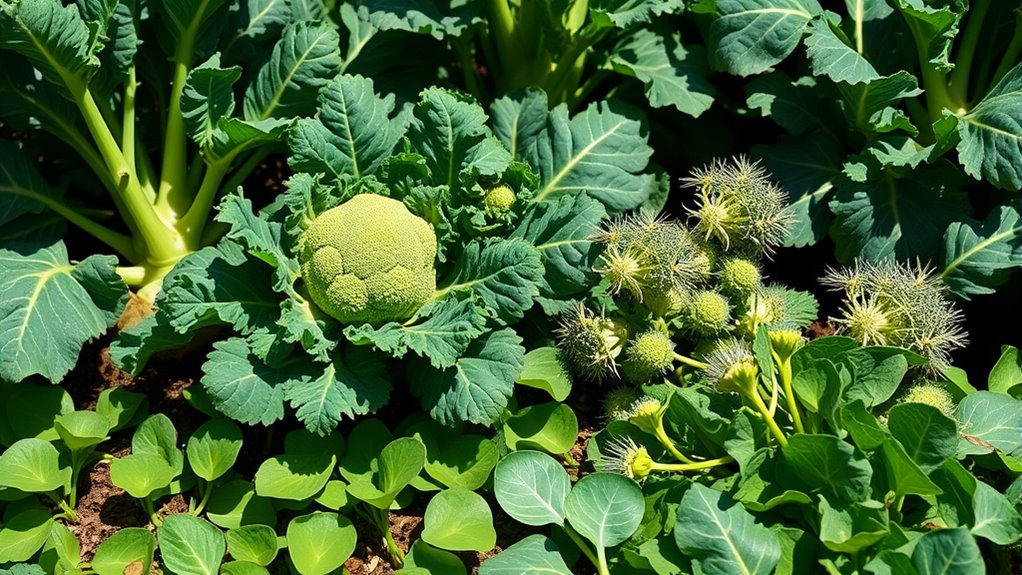
Plantting celery and spinach around your broccoli creates an effective ground cover that suppresses weeds and conserves soil moisture. Their dense foliage shades the soil, reducing weed growth and helping retain moisture during hot days. This minimizes the need for frequent watering and weed control, saving you time and effort. Celery’s sturdy leaves and spinach’s quick-spreading nature make them ideal companions for covering bare soil. Additionally, they don’t compete heavily for nutrients with broccoli, allowing both plants to thrive simultaneously. Planting these greens also attracts beneficial insects that help control pests naturally. Their low-growing habit ensures they won’t overshadow your broccoli, making them a practical choice for maximizing space in your garden. Overall, celery and spinach are excellent options for maintaining healthy, weed-free ground cover around your broccoli plants.
Marigolds and Companion Flowers
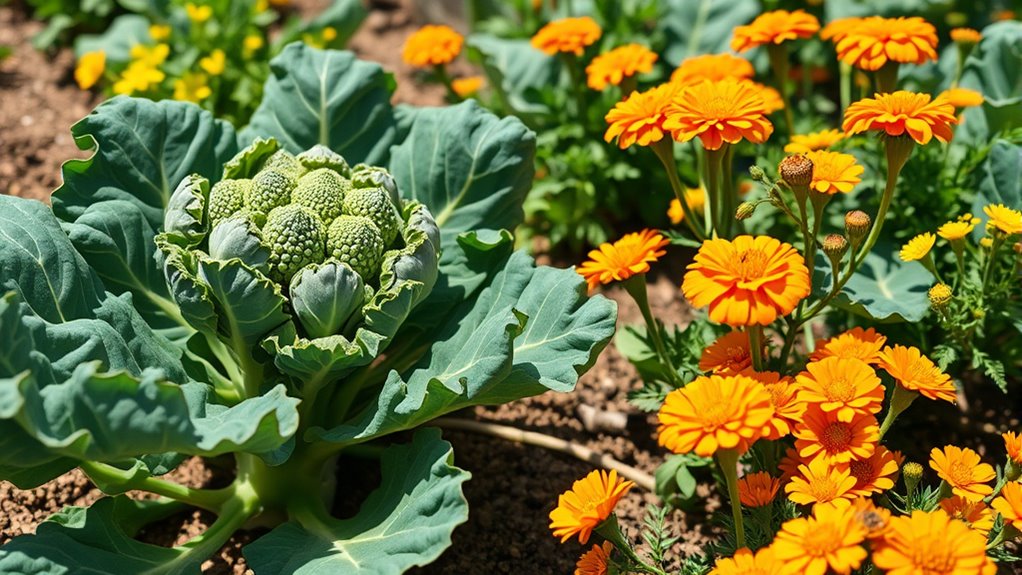
Marigolds and other companion flowers make excellent partners for broccoli by enhancing pest control and adding visual appeal to your garden. Marigolds release compounds that repel pests like nematodes and aphids, protecting your broccoli naturally. Their vibrant blooms attract beneficial insects such as pollinators and predatory bugs, which help keep pest populations in check. Additionally, planting marigolds creates a colorful contrast that lifts the garden’s aesthetic. To maximize benefits, consider these points:
Marigolds naturally repel pests and attract beneficial insects, enhancing your broccoli garden’s health and beauty.
- Pest deterrence: Marigolds act as natural repellents, reducing the need for chemical pesticides.
- Pollinator attractors: Bright flowers draw pollinators that improve broccoli pollination.
- Biodiversity enhancement: Companion flowers encourage a balanced ecosystem.
- Visual appeal: Their cheerful blooms make your garden more inviting and lively.
Frequently Asked Questions
Can Basil Be Grown Alongside Broccoli for Pest Control?
You wonder if basil can be grown alongside broccoli for pest control. Yes, planting basil nearby can help repel pests like aphids and cabbage moths that target broccoli. Basil’s strong aroma confuses pests, discouraging them from attacking your crops. Just make certain both plants get enough space and sunlight. Growing basil with broccoli is an easy, natural way to protect your vegetables without resorting to chemicals.
Do Sunflower Plants Benefit Broccoli Growth as Companion Plants?
You wonder if sunflower plants benefit broccoli growth as companion plants. Sunflowers attract beneficial insects, provide shade, and improve soil health, all of which can support broccoli. They also act as natural pest barriers, reducing pest pressure on your broccoli. By planting sunflowers nearby, you create a lively, balanced garden environment that promotes healthy broccoli growth while enhancing your garden’s overall robustness and resilience.
Are There Any Shade-Tolerant Companion Plants for Broccoli?
You’re curious if shade-tolerant companion plants can benefit broccoli. While broccoli prefers full sun, some shade-tolerant plants like lettuce, spinach, and certain herbs can grow nearby without hindering its growth. These plants thrive in partial shade, making them good companions. Just make certain they don’t compete for nutrients or space. Incorporating shade-tolerant companions can maximize your garden’s productivity without compromising broccoli’s growth.
How Does Crop Rotation Affect Broccoli’s Companion Planting Options?
You might think crop rotation limits your planting options, but it actually enhances your companion planting choices. When you rotate crops, you reduce soil-borne diseases and pests that target broccoli, making certain companions more effective. You can plan your garden to include plants that naturally repel pests or improve soil health, creating a healthier environment for broccoli. Proper crop rotation therefore broadens your options, helping your plants thrive together.
Which Flowers Attract Pollinators Beneficial to Broccoli?
You want to attract pollinators that help broccoli thrive. Planting flowers like marigolds, calendulas, and snapdragons around your broccoli can draw in bees and other beneficial insects. These pollinators improve fruit set and overall plant health. By choosing vibrant, nectar-rich flowers, you create an inviting environment that encourages pollinators to visit, boosting your broccoli’s growth and yield naturally.
Conclusion
So, there you have it—your foolproof guide to turning broccoli into the social butterfly of your garden. Just plant some kale, herbs, and marigolds, and watch pests politely decline your invitation. Who knew that a little botanical matchmaking could save you from endless pest battles? Now, go forth and cultivate your pest-free paradise, because nothing says “green thumb” like outsmarting nature’s little troublemakers with a dash of clever companion planting.
